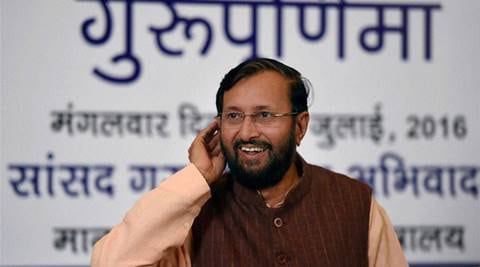Opinion Autonomy for all
The new HRD minister, Prakash Javadekar, has made a break from his predecessor Smriti Irani’s obstinacy and agreed to relinquish the government’s role in appointing the chairperson of the board of governors of the B schools.
 New Delhi: Union Minister for Human Resource Development Prakash Javadekar at the felicitation function of the MPs who are from Academic background, on the occasion of Guru Purnima, at Parliament House, in New Delhi on Tuesday. PTI Photo by Manvender Vashist (PTI7_19_2016_000146A)
New Delhi: Union Minister for Human Resource Development Prakash Javadekar at the felicitation function of the MPs who are from Academic background, on the occasion of Guru Purnima, at Parliament House, in New Delhi on Tuesday. PTI Photo by Manvender Vashist (PTI7_19_2016_000146A) The more than a year-long wrangle between the prime minister’s office (PMO) and the human resource development (HRD) minister over the IIMs has had a happy ending. The new HRD minister, Prakash Javadekar, has made a break from his predecessor Smriti Irani’s obstinacy and agreed to relinquish the government’s role in appointing the chairperson of the board of governors of the B schools. This is just months after Irani went against the PMO and rejected a panel of corporate stalwarts recommended by IIM-Ahmedabad for the chairperson’s post. For the time being, it seems that the IIMs’ demand for autonomy has received a major fillip.
The elite B schools are lucky to have had a supporter in the PMO. Over the past year or so, the PMO has advocated autonomy for the IIMs and, in recent times, it has also mooted setting up of institutes of excellence that will be autonomous of the government. But autonomy to institutions of learning need not be dependent on the PMO’s support or contingent upon their being institutes of excellence. Micro-management by governments and authorities such as the UGC has stifled the creativity of academic institutions without creating any accountability. In recent times, universities have disapproved of an “excessive control mechanism” that obliges them to seek the permission of the UGC on administrative and financial matters. Every small expenditure requires the UGC’s consent. Universities have vice-chancellors, academic heads and executive and academic councils. But they are required to seek the approval of the UGC to start new courses. Once these courses are sanctioned, they have to apply again to the UGC for grants. It is nobody’s case that central authorities like the HRD ministry or the UGC be done away with. But their role in quotidian matters needs to be minimised.
The HRD ministry’s move is a positive one especially given this government’s track record in meddling in affairs of institutions. While past governments have rarely given a free hand to vice-chancellors and the academic bodies of universities, this government has drawn flak — rightly so — for intervening in matters that are usual to the running of an university. The Rohith Vemula case in Central University, Hyderabad, and the JNU case are well known. The HRD ministry’s interventions in these cases betrayed its basic distrust of the academic bodies and authorities in the institutes concerned. Does the government’s decision on the IIM augur a new beginning? One hopes so.



